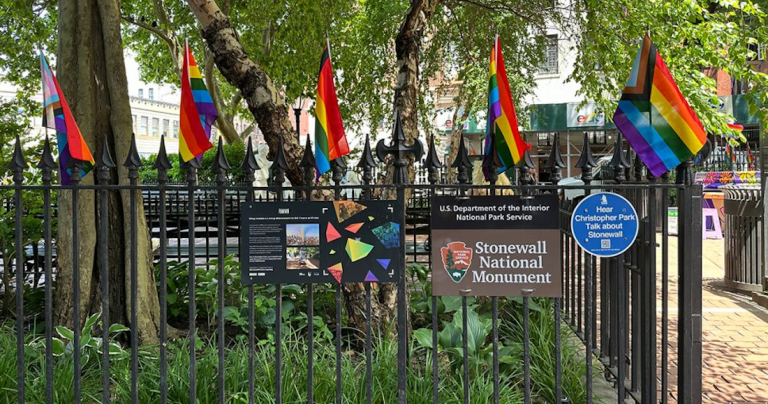
America’s First National Monument Preserves LGBTQ+ History Stands as Beacon of Progress and Remembrance
New York, N.Y. – The Stonewall National Monument stands today as a powerful testament to the courage of LGBTQ+ activists who sparked a movement that transformed American society.
Established in 2016, this historic designation marked the first time the National Park Service recognized a site specifically for its significance to LGBTQ+ civil rights history.
Located in Greenwich Village, technically the West Village, the monument encompasses the iconic Stonewall Inn and Christopher Park, where the pivotal Stonewall Uprising began on June 28, 1969. This rebellion against police harassment became the catalyst for the modern LGBTQ+ rights movement, inspiring decades of advocacy for equality and acceptance.
The Historic Stonewall Uprising
The events that unfolded at the Stonewall Inn in the early morning hours of June 28, 1969, represented a turning point in American civil rights history. Police raids on LGBTQ+ establishments were routine during this era, but on this particular night, patrons and community members fought back with unprecedented determination.
Marsha P. Johnson, Sylvia Rivera, and countless other activists led the resistance against discriminatory enforcement practices that had long targeted the LGBTQ+ community. The uprising continued for several days, drawing national attention to the systematic persecution faced by LGBTQ+ Americans and galvanizing a movement for change.
The rebellion occurred during a time when homosexuality was criminalized in most states, and LGBTQ+ individuals faced widespread discrimination in employment, housing, and public accommodations. The Stonewall Uprising transformed this climate of oppression into an opportunity for organized resistance and advocacy.
Path to National Monument Status
The journey to establish the Stonewall National Monument began with grassroots advocacy from LGBTQ+ organizations, historians, and community leaders who recognized the site’s profound historical significance. These efforts gained momentum as public awareness of LGBTQ+ civil rights history expanded throughout the early 21st century.
President Barack Obama designated the monument on June 24, 2016, using his authority under the Antiquities Act of 1906. This historic decision came just three days before the 47th anniversary of the Stonewall Uprising, emphasizing the timing’s symbolic importance for the LGBTQ+ community.
The designation encompassed 7.7 acres, including the Stonewall Inn building and Christopher Park across the street. This area represents the epicenter of the 1969 uprising and continues to serve as a gathering place for LGBTQ+ advocacy and commemoration.

Monument’s Educational Mission
The Stonewall National Monument serves multiple purposes beyond historical preservation. It functions as an educational resource, helping visitors understand the struggles and triumphs of LGBTQ+ Americans throughout history. The monument’s interpretive programs explore themes of civil rights, social justice, and the ongoing fight for equality.
National Park Service rangers and community partners collaborate to provide programming that connects historical events to contemporary LGBTQ+ rights issues. These educational initiatives help visitors understand how the courage displayed during the Stonewall Uprising continues to inspire advocacy efforts today.
The monument also serves as a symbol of federal recognition for LGBTQ+ contributions to American history. This acknowledgment represents a significant shift from decades of governmental discrimination and marginalization.
Ongoing Preservation Efforts
Maintaining the Stonewall National Monument requires ongoing collaboration between federal agencies, local organizations, and community stakeholders. The National Park Service works closely with the Stonewall Inn owners and local preservation groups to ensure the site’s historical integrity remains intact.
Recent preservation efforts have focused on maintaining the building’s historic character while accommodating its continued operation as a bar and community gathering space. This balance between preservation and contemporary use reflects the monument’s dual role as both historical site and living community institution.
Community organizations continue to advocate for expanded recognition of LGBTQ+ historical sites throughout the U.S., using the Stonewall National Monument as a model for similar designations. These efforts aim to ensure that future generations understand the full scope of LGBTQ+ contributions to American society.
Legacy and Future Impact
The Stonewall National Monument represents more than historical preservation; it embodies the ongoing struggle for LGBTQ+ equality and acceptance. As LGBTQ+ rights continue to evolve, the monument serves as both inspiration and reminder of the work that remains to be done.
Educational programs at the monument connect historical struggles to contemporary issues, helping visitors understand how past activism informs present-day advocacy. This connection between history and current events ensures the monument’s continued relevance for future generations.
The designation of the Stonewall National Monument also demonstrates the federal government’s evolving recognition of LGBTQ+ Americans as full participants in the national story. This acknowledgment represents a significant departure from historical patterns of discrimination and marginalization.
75-Word Summary
The Stonewall National Monument commemorates the 1969 uprising that launched the modern LGBTQ+ rights movement. Located in New York’s Greenwich Village, this historic site preserves the Stonewall Inn and Christopher Park, where activists like Marsha P. Johnson and Sylvia Rivera courageously resisted police harassment. Established in 2016 as America’s first national monument honoring LGBTQ+ history, it serves as an educational resource and symbol of ongoing advocacy for equality and civil rights.
#StonewallMonument #LGBTQHistory #CivilRights #NewYorkHistory #NationalParkService
#StonewallUprising #GreenwichVillage #EqualityMovement #AmericanHistory #CivilRightsMovement
TAGS: Stonewall National Monument, LGBTQ+ history, civil rights, Stonewall Uprising, Greenwich Village,
National Park Service, Marsha P. Johnson, Sylvia Rivera, equality movement, American history,
New York landmarks, historical preservation, social justice, LGBTQ+ advocacy, Christopher Park
